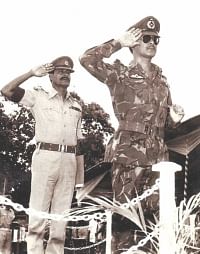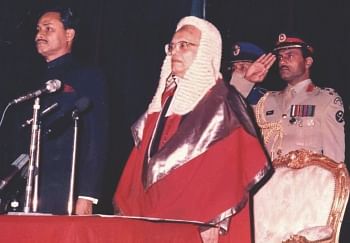| Home - Back Issues - The Team - Contact Us |
 |
| Volume 11 |Issue 51| December 28, 2012 | |
|
|
Current Affairs Licensed to Rule? While court verdicts and constitutional provisions hardly stop ambitious Generals from usurping power, a history of well-practised democracy can Shakhawat Liton
The Appellate Division of the Supreme Court in its recently released full verdict in the constitution seventh amendment case calls declaration of martial law an act of high treason against the state. It further states that any person who declares martial law and ousts an elected government or attempts to do so, he and his associates would be liable for high treason against the Republic of Bangladesh. The full text of the verdict, which was released 19 months after pronouncing it, has, in fact, reiterated and echoed a previous judgment on the Fifth Amendment case, where the AD strongly denounced martial law and suspension of the country's constitution, and recommended meting out suitable punishment to the perpetrators. Upholding the High Court Division's historic ruling of 2005 that had declared the Fifth Amendment to the constitution illegal, the AD also said that it was up to the parliament to enact laws to prevent martial law. "We are putting on record our total disapproval of martial law and suspension of the constitution or any part thereof in any form. The perpetrators of such illegalities should also be suitably punished and condemned so that in future no adventurist, no usurper, would dare to defy the people, their constitution, their government, established by them with their consent," the apex court concluded in its full verdict released in July, 2010. It also said military rule was wrongly justified in the past, and it should not be justified in future on any ground. "Let us bid farewell to all kinds of extra constitutional adventure forever," it observed. After the release of the full text of the landmark verdict, the High Court in August 2010 declared illegal the Seventh Amendment which validated and ratified country's second martial law regime. And the AD in May 2011 upheld the HC verdict. All the verdicts came long after the two martial law regimes were over. The verdicts came during the regimes of civil governments. And unfortunately, some judges of the apex court in the past failed to uphold the supremacy of the constitution and spoke in favour of martial law proclamations when the martial law regimes were in power. However in light of the apex court's full verdict on the Fifth Amendment case, a stringent provision was inserted in the constitution in June, 2011 to prevent extra-constitutional takeover and protect the constitution. The provision provides punishment for the offence of abrogation, suspension, etc of the constitution.
It [Article 7A] says: "(1) If a person, by show of force or use of force or by any other unconstitutional means (a) abrogates, repeals, or suspends or attempts or conspires to abrogate, repeal or suspend this Constitution or any of its article; or (b) subverts or attempts or conspires to subvert the confidence, belief or reliance of the citizens to this Constitution or any of its article, his such act shall be sedition and such person shall be guilty of sedition. "(2) If any person (a) abets or instigates any act mentioned in the clause (1); or (b) approves, condones, supports or ratifies such an act, his such act shall also be the same offence. "(3) Any person alleged to have committed the offence mentioned in this article shall be sentenced with the highest punishment prescribed for other offences by the existing laws." But can the stringent provision law alone prevent extra-constitutional takeover or protect the constitution? It is a very crucial question. Extra constitutional usurpation of state power happened twice in Bangladesh. And these acts were illegal. They knew it and therefore both the martial law rulers Gen Ziaur Rahman and Gen Ershad had desperately sought to legitimise their regimes. So, they formed political parties--BNP and Jatiya Party. Their parties won the parliamentary elections and then amended the constitutions to legalise their illegalities. The constitution and also the army laws did in no way allow them to grab state power. But it happened twice. Time will however say whether the stringent constitutional provision alone can prevent extra-constitutional takeover and protect the constitution. Like Bangladesh, Pakistan had experienced a similar situation. The Supreme Court of Pakistan in April, 1972 took a very strong stance against extra-constitutional takeover. It declared General Yahya Khan's martial law regime to be illegal. Gen Yahya Khan was also a Commander in Chief of the Pakistan army who imposed Martial Law in March 1969, after receiving a written letter from Gen Ayub Khan, the then president of Pakistan "to do your duty to run the country." Gen Yahya performed his duty by promulgating another martial law the next day and abrogated the 1962 constitution of Ayub Khan and introduced the "Legal Framework Order" containing the rules relating to the holding of general elections and framing of the future constitution for Pakistani people. His rule was announced illegal four months after his departure as his rule ended on December 20 of 1971 four days after the fall of Dhaka, where Pakistan army surrendered. In this case, commonly known as Asma Jilani Case, the Pakistan Supreme Court also criticised former chief justice Mohammad Munir and other judges for their past support to martial law. Pakistan Supreme Court directly or indirectly favoured the extra-constitutional takeover since 1953, contributing largely to the rise of military rulers Gen Iskander Mirza, Gen Ayub Khan and Gen Yahya Khan. For example, in the October of 1958, the then chief justice of Pakistan Muhammed Munir called General Iskander Mirza's dissolution of the second constituent assembly and abrogation of 1956's constitution, a 'legalised illegality'. When Iskander Mirza declared martial law in 1958, Justice Munir and the Supreme Court were readily available to place a judicial stamp of approval on what had taken place. However, the Supreme Court's strong stance against extra-constitutional takeover in April 1972 prompted the then Pakistani government to insert a new provision in the new constitution of 1973 to prevent the army from dismissing the constitution and imposing martial law. But lack of democratic practices and lack of obedience to constitutional provisions made it impossible to prevent the extra-constitutional takeover. Within a few years, General Zia ul Haque grabbed the state power in extra-constitutional way in 1977. And it is interesting to note that the Pakistan Supreme Court declared his takeover illegal only after his death. The way the judgement was delivered made Ejaj ul Haq, Gen Zia's son, publicly boast in a moment of truth that had his father been alive the judgment could not have been delivered. Pakistan again went through a rough patch when General Parvez Mosharraf grabbed the state power in 1999 by overthrowing the then elected government. General Musharraf's rule ended completely in September 2008 through restoration of democracy. But growing political animosities between ruling and opposition parties and an alarming escalation of political violence, terrorism and targeted killing increase the risk of extra-constitutional takeover in Pakistan. Given the above experiences, it is really difficult to surely say that a stringent constitutional provision alone will be able to prevent extra-constitutional takeover and to protect the constitution. Only a history of well-practised democracy can effectively block the way to such extra-constitutional misadventures. The writer is Senior Reporter, The Daily Star.
|
||||||||
Copyright
(R) thedailystar.net 2012 |

